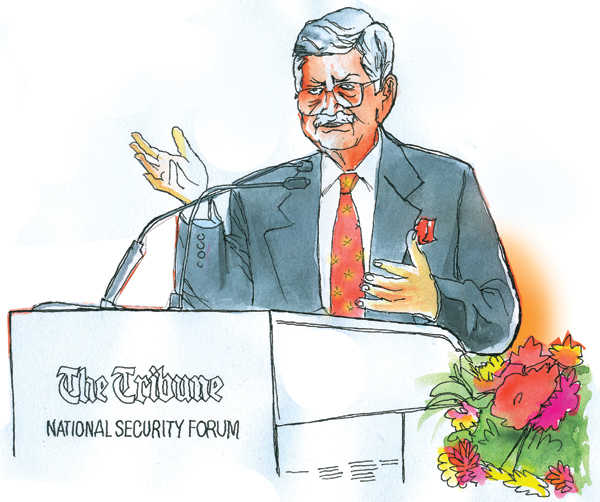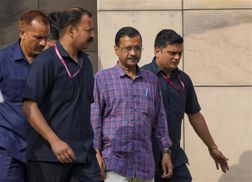
Illustrations: Sandeep Joshi
Harish Khare
Yesterday, we at The Tribune made a kind of a new beginning. We had the first of the annual lecture series under the aegis of the Tribune National Security Forum.
The Tribune founder, the visionary Sardar Dyal Singh Majithia, had tasked the future generation of The Tribune overseers to ensure dissemination of information, knowledge and learning. It was his belief that a society imbued with the outlets and platforms of information was an empowered society, capable of discussing reasonably and rationally great issues of the day and that such knowledge would help society sort out its collective dilemmas.
The Annual Lecture Series is a modest attempt to carry forward that mandate of the Founder. It is increasingly being recognised that national security is too serious a matter to be left to only the politicians and generals. And, national security is no longer just a matter of armies facing each other across dug-up trenches; today, national security and national defence are all-inclusive problems. The new tools of social media have empowered the common citizen. Hence, our effort to involve the citizens — and the readers — in understanding India’s defence.
And, to kickstart our historic initiative we could not have had a more qualified lead speaker than General Ved Malik, former Chief of the Indian Army. Admittedly, he did a superb job. His formidable intellectual sweep, his keen sense of appreciation of history and geography, and his experience of leadership — in times of war and peace — were very much on display and, in fact, completed the profile of a perfect speaker.
Then, we had Professor SS Johl lending his distinguished presence as the presiding officer. He added a non-fauji perspective to the evening. A satisfying evening. A sense of mission renewed and a service performed for society.
That brings me to talk about Shivshankar Menon. Shankar is a khandani diplomat. He belongs to a special breed within that special band of men and women — the Indian Foreign Service — and this breed has served India with distinction, panache, dedication, commitment and competence. His grand-father (the legendary KPS Menon, the senior) and his father PN Menon, both belonged to that category of public servants who steered the Indian foreign policy in the early years when a new, independent India searched for its space and place in an uncertain world. And, just to make it a close family affair, Shankar was astute enough to marry the daughter of a foreign secretary. Having served as India’s envoy in Israel, Sri Lanka, China, and Pakistan, he was destined, sooner or later, to become Foreign Secretary and was bound to end up as a National Security Adviser.
I was at a dinner when I was informed that Shivshankar Menon had been named as the next Foreign Secretary. I remember cynically commenting to a fellow guest at the dinner table — TK Nair, Principal Secretary to the Prime Minister — something about the “Mallu mafia” cornering one more plum job. I was later to learn that Shivshankar was more at home in Hindustani than Malayalam. As a colleague in the Prime Minister’s Office, I found him remarkably cosmopolitan in taste and an extraordinarily well-read man, even for a foreign service officer.
So, when he produced a slim book on the Indian foreign policy, I eagerly looked forward to reading it. And, I confess
CHOICES — Inside the Making of India’s Foreign Policy does not disappoint. It bears the hallmark of a self-assured man offering sophisticated insights and interpretations on how New Delhi has to deal with the external world, a world that is demanding, exacting and not a whit impressed with our nightly self-flagellation.
Shankar has chosen a clever format. He has selected to meditate on five defining moments in our recent foreign policy; his excuse is that he has cherry-picked these because he was involved with these momentous moments and can, therefore, speak with a certain degree of personal knowledge and authority. Fair enough. We will grant him his choices.
But what I found exceptionally impressive was that each chapter is preceded by two or three epigrams — ranging from a ninth-century Baghdad wazir, to Faiz Ahmed Faiz, Gandhi and Buddha. These epigrams provide the cautionary preface to the crises discussed and how these were dealt with. A very pleasing exhibition of learning and erudition. Foreign policy has always been a matter of prime ministerial initiative and action. The prime minister’s personality matters. Shankar writes:
“Personalities matter. With a different mix of people at the helm, it is quite possible that India would have chosen differently. In fact, if India is forced to make a similar choice in the future, I am sure, it will respond differently.”
With great subtlety and sophistication, Shankar debunks our current obsession with the idea of a strong prime minister as a panacea for all our problems at home and abroad. On the contrary, he argues that “The corollary to the central role of the prime minister in decision-making is weak institutionalization of foreign policy implementation in India. Weak institutionalization is reflected in weak policy implementation.” Simple. Deadly accurate. Not to be wished away, even if a million social media tweets get generated in praise of Modi.
His wisest of observations is reserved for the last few pages when he raises a simple question: “Why should India want to be a great power?” Yes, we need to be a great power because we simply cannot be a satellite to any other power. But this pursuit of great power status cannot be a foray into megalomania or xenophobia: “Power is the ability to create and sustain outcomes. Weight we have, our influence is growing, but our power remains to grow and should first be used for our domestic transformation.”
Touche`
Millions of words have already been written about Fidel Castro since he passed away on November 26. Some words were kind and indulgent, but most commentators chose to focus on his association with the failed model of communism. However, I think part of his charming appeal for generations all over the world is because he had dared to stand up to the US. In that defiance, he had for company only two leaders — Ho Chi Minh of Vietnam and Ayatollah Khomeini of Iran. They refused to give in to the United States’ post-war hegemony and the demands that hegemony made on friends and foes alike. Ho Chi Minh and Ayatollah Khomenini could defy and get the better of the US because they were revolutionary leaders of sizeable countries, but Castro’s Cuba is a tiny island, very vulnerable and always within America’s reach. That made Castro’s defiance dangerous — and alluring.
That Castro was handsome and young only added a touch of charisma to his defiance of the US and he became an embodiment of iconic opposition to Uncle Sam. He remained unbent and unbowed till his death. And that will remain the core of the Castro mystique.
We in this part of the world were fascinated by the Nabha jailbreak. It became a national headline because a known Khalistani activist was among those who broke out. The so-called KLF chief soon got caught and the national interest in the story ebbed away.
Though as a law-abiding citizens all of us must firmly disapprove of anyone escaping a prison, it needs to be recognised that a jailbreak takes considerable planning and application of mind. It requires daring, resources and an untamed mind.
A jail is, after all, a daily contest of wits and ingenuity, guile and cunning between the jailor and his staff and the prisoners, who resent their incarceration. The equations are sorted out with violence and bribery; and, the police force does not always come out as the winner.
In Punjab, it seems it is a thorough mismatch. Most of the high quality prisoners have patrons among politicians and are allowed to have a run of the place inside the jails. On the other hand, the police force is overloaded with incompetence, low morale, and lower morals.
The Nabha jailbreak has a wider dimension. It should be a matter of considerable alarm for any national security manager that convicted secessionists, criminals and gangsters are effortlessly able to remain in touch with friends and patrons outside, including those across the border.
Though these guys are able to lay their hands on almost everything in the jail, I am pretty sure they cannot get good coffee. Nor are they going to get an invitation to join me for a cup. Anyone else?



























